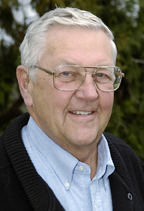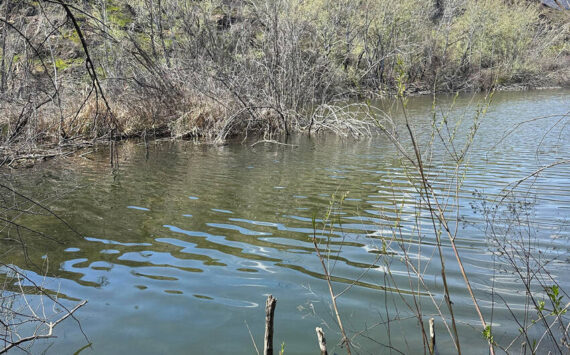
7th District Sen. Bob Morton
OLYMPIA – A measure sponsored by Sen. Bob Morton (R-7th District) which would benefit his district’s local economy and reduce the number of trucks on Highway 97 and perhaps I-5, passed the state Senate on Valentine’s Day.
The measure, Substitute Senate Bill 6857, would direct the Washington State Department of Transportation (WSDOT) to designate about a seven-mile stretch of SR-97 from the Canadian border to Oroville as a heavy haul industrial corridor.
Currently, Canadian trucks must off-load on the Canadian side of the border to redistribute the weight to other trucks and then off-load again at Oroville at the rail head. SSB 6857 would allow trucks to use the corridor with WSDOT special permits for gross truck weights up to 137,000 pounds — about a third more weight than currently allowed.
“I think this will be a real asset to the town since we have the rail head right here,” said Oroville Mayor Chuck Spieth. “I know the railroad has been struggling to keep the line going and this will be a boost to them and to the area.”
The U.S. Port of Entry at Oroville is the only crossing in Eastern Washington open 24 hours a day. It is a gateway for the hauling of fruit and lumber. At Oroville, truck loads are put on the Cascade & Columbia River Railroad to go to the Wenatchee area and shipment across the nation.
“This change in law will not only reduce the number of trucks on the road, but it will help our local economy and promote industrial diversification,” Morton said.
Okanogan County Commissioner Bud Hover, Oroville Planning Director Chris Branch and Ryan Ratledge and Catherine Martin of the Cascade & Columbia River Railroad traveled to Olympia to testify in favor the SSB 6857 during a public hearing in the Senate Transportation Committee on Feb. 7. The bill was also sponsored by Sen. Linda Parlette (R-12th District), as well as Senators Mary Margaret Haugen (Chairwoman of the Transportation Committee), Dan Swecker (ranking minority member of the Transportation Committee), Harriet Spanel, Curtis King and Jerome Delvin.
“I know Chris [Branch] has been working long and hard on this and I know it had a lot of support from others within and outside the area,” said Spieth.
Currently the rail head is used extensively by Oroville Reman and Reload, which unloads trucks from Canada and reloads the products onto C&CRRR railcars. They also unload rail cars and put goods on trucks heading to Canada, according to Mark Bordwell, general manager for the company. Much of what Reman and Reload, a Canadian-owned firm, loads onto the railcars is dimensional lumber and wood pellets, but the firm has handled many diverse products over the years ranging from bottled water heading south to Nebraska-grown popping corn heading north, according to Bordwell.
“I’ve been working on this issue off and on for the past 15 years,” Bordwell said, giving much credit to Planner Branch for finally getting the attention of the state.
“I’m a small fish… I guess I’m not so good at getting what I’m wanting across as to why it would be good for our area, but Chris was able to do so,” Bordwell said.
“Since the Weyerhauser Chip Plant slowed down so much because of the shortage of wood chips this designation has become crucial,” Bordwell said. “We used to have the railroad making runs up to Oroville five days a week now they only come up two or three. With the heavy freight designation we can get more product to ship and the number of carloads up… we were not very far from the point where people were going to start asking if we really needed a railroad at this end.”
Bordwell believes the designation will allow Oroville to compete with other reloading facilities across the United States — especially in the I-5 Corridor to the west where there is a reload facility at Sumas and at Eastport, Idaho to the east.
“We were at a disadvantage,” said Bordwell. “There are reloading facilities across the 48th and several that were within 100 miles of the border already. These all had the advantage of being able to unload Canadian weight trucks,” he said.
Almost a year ago to the day Bordwell told the Gazette-Tribune that a heavy freight corridor designation could mean putting on an extra shift at Reload and Reman. At that time Howard Zosel, with the family-owned Zosel’s Lumber Mill, said the new designation could mean an additional 50 more employees for their business.
And rather than just taking away freight from the I-5 corridor the new designation might be a good thing for the west side, relieving congestion and giving shippers an alternative to crossing the Cascades with their freight.
“Traffic has been a real problem along the I-5 Corridor for several years now and weather closed the passes several times this year,” Bordwell said.
The designation might also attract other businesses looking to take advantage of the rail head at Oroville. From Oroville the railcars head south to Wenatchee and from there can be hooked on to the Burlington Northern and Santa Fe to be distributed across the country.
“We ship all over the country from California to New York and Florida and North Carolina… all over the U.S., Bordwell said.
The bill passed with 48 senators voting for, and zero against, the measure.





